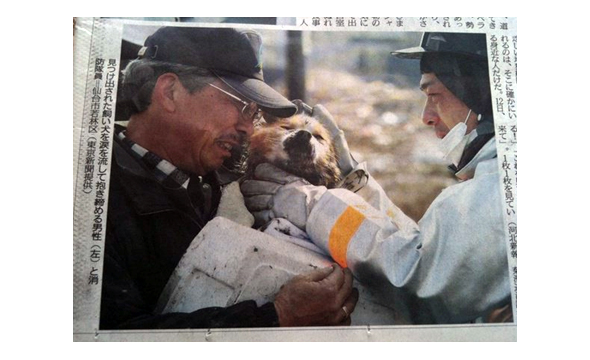As one can imagine, one of the frequent topics of conversation in the Winograd household is the No Kill movement. To our kids, “Oreo” is not a chocolate wafer cookie, but an abused dog betrayed by those who were supposed to protect her. And when Nathan recently shared exciting news with the family about Austin’s success, our 10-year old son sagely inquired, “What is their save rate?”
Like most people, we have been following the aftermath of the natural and man-made disasters plaguing Japan. We’ve paid special attention to the animal related stories. Together, we marveled at the inspiring ones: the dog that would not leave the side of his injured comrade, and the animals and their people, separated during the disaster, joyfully and tearfully, reunited.
And together, we lamented the tragic ones: Japanese “shelters” announcing that they were gassing animals after a paltry 72 hours. But a few days ago came the most captivating story of them all: the story of a dog found alive, living on a roof, miles and miles out at sea. The kids were thrilled when Nathan told them. Together, we watched the video of his rescue by the Japanese Coast Guard.
[display_podcast]
But our initial elation was short lived. “Where is he now?” our daughter asked. To which Nathan replied that we didn’t know, that hopefully he’d go to a rescue group if they could not find his family, but that he might be on his way to a shelter. And quick as a flash, my son did the math, his excitement turned to panic, and he turned his worried face to us and asked, “Are they going to kill him?”
Here was a dog with an iron will to live, a dog who had survived a devastating earthquake, a massive tsunami, and three long weeks alone floating on a roof in the middle of the sea, with no fresh water, and only garbage to eat. But, if indeed that was the plan, would he survive his trip to the local “shelter”? Or would he end up like the dog who survived war-torn Afghanistan, was adopted and brought to live in the U.S. by one of the soldiers whose life he saved from a roadside bomb, only to be immediately killed at the local shelter when he escaped his yard?
What could we say to a kid so wise in the ways of the dysfunctional sheltering world? I hugged him close and said that I certainly hoped not. To which he quietly responded, “Me, too.” And we were left to ponder what was the more absurd—that we live in a world in which a young boy would be compelled by logic to ask such a question? Or that we could not answer without certainty that they would not?
*
April 4 Update: The BBC reports that the dog and family have been reunited.
